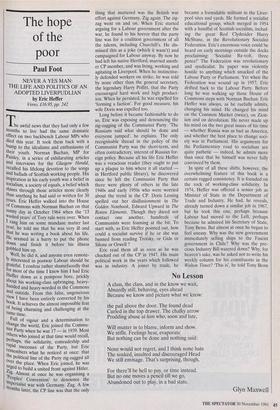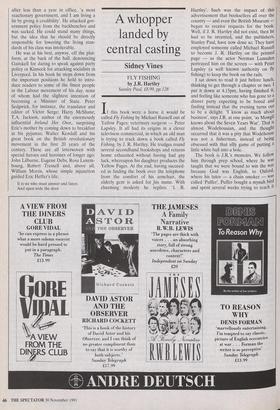The hope of the poor
Paul Foot
NEVER A YES MAN: THE LIFE AND POLITICS OF AN ADOPTED LIVERPUDLIAN by Eric Heifer Verso, £16.95, pp. 242 The awful news that they had only a few months to live had the same dramatic effect on two backbench Labour MPs who died this year. It took them back with a bump to the idealisms and enthusiasms of their youth. Norman Buchan, MP for Paisley, in a series of exhilarating articles and interviews for the Glasgow Herald, recalled his lifelong devotion to the songs and ballads of Scottish working people. His Inspiration in his early youth was a belief in socialism, a society of equals, a belief which shines through those articles more clearly than anything he had said or written for 30 Years. Eric Heffer walked into the House of Commons with Norman Buchan on that sunny day in October 1964 when the '13 wasted years' of Tory rule were over. When I rang him on some mundane matter last Year, he told me that he was very ill and that he was writing a book about his life. He seemed in a hurry to put the phone down and finish it before his illness gobbled him up. Well, he did it, and anyone even remote- ly interested in postwar Labour should be grateful. I confess rather shamefacedly that for most of the time I knew him I had Eric Heffer down as a pompous bore, prickly about his working-class upbringing, heavy- banded and heavy-worded in the Commons and outside. From this false, ungenerous view I have been entirely converted by his book. It achieves the almost impossible feat of being charming and challenging at the same time. Full of vigour and a determination to change the world, Eric joined the Commu- nist Party when he was 17 — in 1939. Most others who joined at that time would recall, Perhaps, the solidarity, comradeship and rapid successes of the Party, but Eric remembers what he noticed at once: that the political line of the Party zig-zagged all over the place. When Eric joined, he was urged to build a united front against Hitler. ,`-t;g. Almost at once he was organising a Peoples' Convention' to denounce the imperialist war with Germany. Zag. A few months later, the CP line was that the only
thing that mattered was the British war effort against Germany. Zig again. The zig- zag went on and on. When Eric started arguing for a Labour government after the war, he found to his horror that the party line was for a coalition government of all the talents, including Churchill's. He dis- missed this as a joke (which it wasn't) and campaigned for Labour anyway. By now he had left his native Hertford, married anoth- er CP member, and was living, working and agitating in Liverpool. When he instinctive- ly defended workers on strike, he was told by none other than the general secretary, the legendary Harry Pollitt, that the Party encouraged hard work and high product- ion. When he persisted, he was expelled for `forming a faction'. For good measure, his wife Doris was expelled too.
Long before it became fashionable to do so, Eric was exposing and denouncing the zig-zagging of the Communist Party. 'The Russians said what should be done and everyone jumped', he explains. The only recognisable thread in the policy of the Communist Party was the short-term, and often contradictory, interest of Russian for- eign policy. Because all his life Eric Heifer was a voracious reader (they ought to put up a plaque to him where it all started in Hertford public library), he discovered since he left the Communist Party that there were plenty of others in the late 1940s and early 1950s who were worried about the trend in the CP. Doris Lessing spelled out her disillusionment in The Golden Notebook, Edward Upward in The Rotten Elements. Though they dared not contact one another, hundreds of Communists were foaming at the bit. To start with, as Eric Heifer pointed out, how could a socialist survive if he or she was banned from reading Trotsky, or Gide or Silone or Orwell ?
Eric read them all as soon as he was chucked out of the CP in 1947. His main political work in the years which followed was in industry. A joiner by trade, he became a formidable militant in the Liver- pool sites and yards. He formed a socialist educational group, which merged in 1954 with a handful of Scottish socialists, includ- ing the great Red Clydesider Harry McShane, in the Revolutionary Socialist Federation. Eric's enormous voice could be heard on early mornings outside the docks proclaiming: 'Socialist Re-volt, three pence? The Federation was revolutionary and syndicalist. Its paper was violently hostile to anything which smacked of the Labour Party or Parliament. Yet when the Federation was wound up in 1957, Eric drifted back to the Labour Party. Before long he was walking up those House of Commons steps with Norman Buchan. Eric Heifer was always, as he ruefully admits, changing his mind. He changed his mind on the Common Market (twice), on Zion- ism and on devolution. He never made up his mind on the two great issues of his time — whether Russia was as bad as America, and whether the best place to change soci- ety was in Parliament. His arguments for the Parliamentary road to socialism are quite pathetic — indeed, he admits more than once that he himself was never fully convinced by them.
In spite of all these shifts, however, the overwhelming feature of this book is a certain rugged consistency. It is founded on the rock of working-class solidarity. In 1974, Heifer was offered a senior job as Minister of State in the Department of Trade and industry. He had, he reveals, already turned down a similar job in 1967, but he took this one, perhaps because Labour had moved to the Left, perhaps because he admired his Secretary of State, Tony Benn. But almost at once he began to feel uneasy. Why was the new government immediately selling ships to the Fascist government in Chile? Why was the pre- cious Industry Bill watered down? Why, for heaven's sake, was he asked not to write his weekly column for his constituents in the Walton Times? 'This is', he told Tony Benn
after less than a year in office, 'a most reactionary government, and I am living a lie by giving it credibility'. He attacked gov- ernment policy from the backbenches and was sacked. He could stand many things, but the idea that he should be directly responsible for lowering the living stan- dards of his class was intolerable.
He was at his best, anyway, off the plat- form, at the back of the hall, denouncing Gaitskell for daring to speak against party policy or Kinnock for attacking socialists in Liverpool. In his book he steps down from the important positions he held to intro- duce readers to some of the finest people in the Labour movement of his day, none of whom had the slightest intention of becoming a Minister of State. Peter Sedgwick, for instance, the translator and editor of Victor Serge; Harry McShane; T.A. Jackson, author of the enormously influential Ireland Her Own, surprising Eric's mother by coming down to breakfast in his pyjamas; Walter Kendall and his great book on the British revolutionary movement in the first 20 years of the century. These are all interwoven with• special heroes and heroines of longer ago: John Lilburne, Eugene Debs, Rosa Luxem- bourg, Robert Tressell and, above all, William Morris, whose simple injunction guided Eric Heifer's life: It is we who must answer and listen And open wide the door











































































 Previous page
Previous page